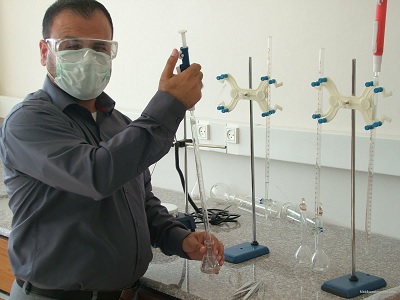
During the 2008/9 Israeli offensive on the Gaza Strip, when Israel and Egypt completely restricted the movement of people and goods into and out of the coastal enclave, Mohamed Al-Asqalani developed a gluten-free flour which is a godsend for patients in the territory suffering from celiac disease, as well as those who have autism and phenylketonuria (PKU). The Palestinian chemist worked on the process after hearing from a colleague whose wife suffered from celiac disease and had run out of the special flour that she depended on.
“Israeli drones were roaring overhead and fighter jets were striking homes, schools and universities,” he explained. “Then I received an unexpected urgent call which kicked the whole thing off.”
There are three types of celiac disease, the rarest of which causes a severe allergic reaction and can lead to death if the patient eats non-gluten free food. Patients suffering from the other two types can get complications and morbidity if they don’t have gluten-free food, although celiac disease will not kill them directly. According to Al-Asqalani, two celiac patients died during the 22-day offensive in 2008/9.
“I had no previous knowledge of this kind of illness or the patients who suffer from it,” he revealed. “I did not know what kind of flour was needed. All I did know is that it is flour free of protein.” Gluten is the protein found in wheat, rye and barley.
Al-Asqalani launched his research at home, using kitchen appliances instead of lab equipment. Although he developed a flour made from corn, “which filled the gap”, he was not entirely satisfied with it. “It did not have the specifications of normal wheat flour.” As such, it could not be used to make popular Palestinian dishes and so was not adopted by local bakeries. It was important, he said, to make sure that celiac sufferers were not made to feel out of place around the family table.
When the Israeli offensive ended, he was able to make contact with celiac patients in Gaza, Egypt, Saudi Arabia, the UAE and Jordan. “I was even contacted by Human Land Charity in Gaza, the only official body looking after celiac patients,” he said. “All of them complained of one major problem, even when they can get their special flour which meets international standards.” The best gluten-free flour comes mainly from Italy and Israel, he explained, but it is not suited to Arab cuisine.
“As such,” said Al-Asqalani, “in 2010 I started the second stage of my research, planning to produce gluten-free flour that is suitable for making all kinds of meals so that patients are able to eat different kinds of food, like those without the disease.”
The major challenge that he faced was working from home and paying for his research from his own pocket. “Despite the huge demand for gluten-free flour, no individuals, organisations or governments have funded what is expensive research.”
Undaunted, he carried on. “Using a number of gluten-free food materials in addition to licensed e-number additives, I produced the new gluten-free flour, which is usable in all kinds of meals and by all bakeries; it has the same flavour as normal wheat flour,” said the chemistry PhD holder. His research has taken him 5 years and the new product has been tested and approved by the Saudi Food and Medicine Centre and the Egyptian National Centre for Food Research.
Al-Asqalani is satisfied with the outcome of his work because he has offered a solution for thousands of patients in need for such a product, not only in Gaza or the Arab countries, but also around the world. He is applying for the necessary licences to produce his flour commercially.
“I have received several offers to set up factories in different Arab countries such as Saudi Arabia,” he revealed, “where there are more than 400,000 patients in need for this flour, as well as the UAE, Egypt and Jordan, but because of the Israeli siege, I am unable to move to any of them.” With around 5,000 potential customers in Gaza alone, however, Al-Asqalani said that he is able to set up a commercial production line for his product. “I look at this product from a humanitarian aspect and cannot persuade myself to make profits from other people’s suffering.”
Despite his success and the huge need and demand for his product, Al-Asqalani is still looking for people to adopt the project to pay for setting up a reliable factory to produce sufficient gluten-free flour for those who need it across the Gaza Strip; if possible, and if the Israeli siege is lifted, it could also be exported. He now has the use of a simple laboratory at Al-Israa University, which is progress of sorts.
“The ingredients are easily afforded and production is very cheap,” he said. “Although the Palestinians in Gaza are still dependent on the Italian and Israeli products, lab tests suggest that my product is more reliable.” It’s also much cheaper; 1 kilogram of Al-Asqalani’s gluten-free flour costs around $1.50, compared to $15 for the Israeli and Italian products.
While he was developing his flour, Al-Asqalani also produced gluten-free milk, which is essential for PKU patients. “I could develop these products while living under Israeli siege and bombs,” he mused. Imagine what he could do without the Israeli siege and full financial backing.




